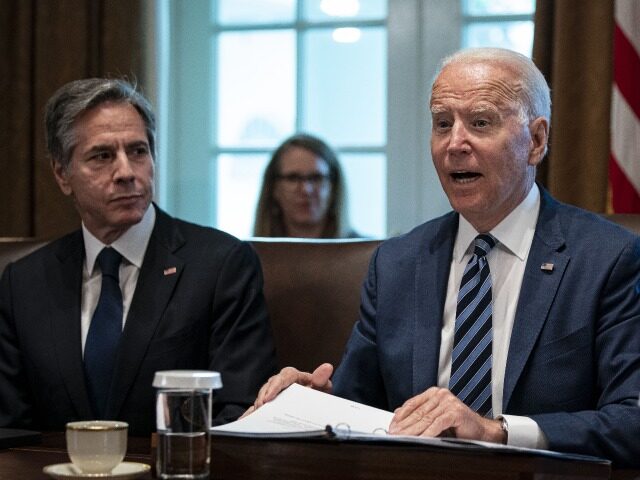Secretary of State Antony Blinken announced Monday that President Joe Biden would visit Israel on Wednesday, Oct. 19. It was a sign of solidarity — the first-ever visit of a U.S. president to Israel during wartime. But the visit appears to have come at a price: the announcement came after eight hours of meetings between Blinken and Israeli Prime Minister Benjamin Netanyahu, during which the two countries reportedly discussed humanitarian safeguards that, critics fear, could hurt the fight against Hamas.
Israel has been conducting airstrikes on the Palestinian terrorist group for ten days, since the brutal attack Oct. 7 that claimed an estimated 1,200 Israeli lives, wounded over 4,100, and led to roughly 200 people being taken hostage to Gaza, including children.
The Israeli Defense Force (IDF) has massed 100,000 troops on the Gaza border, and warned Palestinian civilians to evacuate the northern Gaza Strip. Hamas is preventing civilians from evacuating — and Egypt is preventing them from leaving Gaza itself.
Critics, such as Caroline Glick, argue that the most humanitarian approach would be to get rid of Hamas as soon as possible, since the terror group controls any humanitarian aid that reaches the Gaza Strip. Earlier this week, for example, Hamas terrorists stole fuel and medical supplies from the United Nations Relief and Works Agency (UNRWA), which takes care of Palestinian refugees. There is also possible that aid trucks could be used to smuggle weapons — or could be turned into makeshift weapons themselves.
The advantage of having U.S. buy-in to Israeli humanitarian plans is that the White House could shield Israel from the usual pressure that comes from the international community whenever it fights back against terrorist groups that hide among civilians. Such pressure almost always leads to cease-fires that leave Hamas — or, in Lebanon, Hezbollah — in place, able to rearm and to plan more ambitious attacks. The disadvantage is that the U.S. may attempt to hold Israel back from finally finishing Hamas.
On Monday, analysts on Israel’s Army Radio described Biden’s strategy in dealing with Israel — which he adopted somewhat recently, since the left-wing, Obama-era approach of confrontation and “distance” had simply encouraged Israel’s enemies. Now, Biden is embracing Netanyahu tightly — a “hug” that looks the same as strong support, but that also constrains Netanyahu to acting within strict confines imposed by the White House. Whether this “hug” leads to Hamas’s defeat remains an open question.
Regardless of U.S. strategy, it seems clear that the Israeli public will accept nothing less than the complete removal of Hamas. The terrorist group released a video of one of the hostages Monday, evidently hoping to increase domestic pressure within Israel that could force Netanyahu to negotiate rather than going to war. But while there are 200 hostages, there are 1,400 bereaved families, and a “people’s army” that wants to make sure that Hamas can never threaten the lives of Israeli civilians in their homes again.
Editor’s Note: This story was updated to reflect a revised number on the death toll from the October 7 Hamas attack in Israel. The Israeli government estimate of 1,400 was revised to around 1,200, according to Reuters.
Joel B. Pollak is Senior Editor-at-Large at Breitbart News and the host of Breitbart News Sunday on Sirius XM Patriot on Sunday evenings from 7 p.m. to 10 p.m. ET (4 p.m. to 7 p.m. PT). He is the author of the new biography, Rhoda: ‘Comrade Kadalie, You Are Out of Order’. He is also the author of the recent e-book, Neither Free nor Fair: The 2020 U.S. Presidential Election. He is a winner of the 2018 Robert Novak Journalism Alumni Fellowship. Follow him on Twitter at @joelpollak.

COMMENTS
Please let us know if you're having issues with commenting.